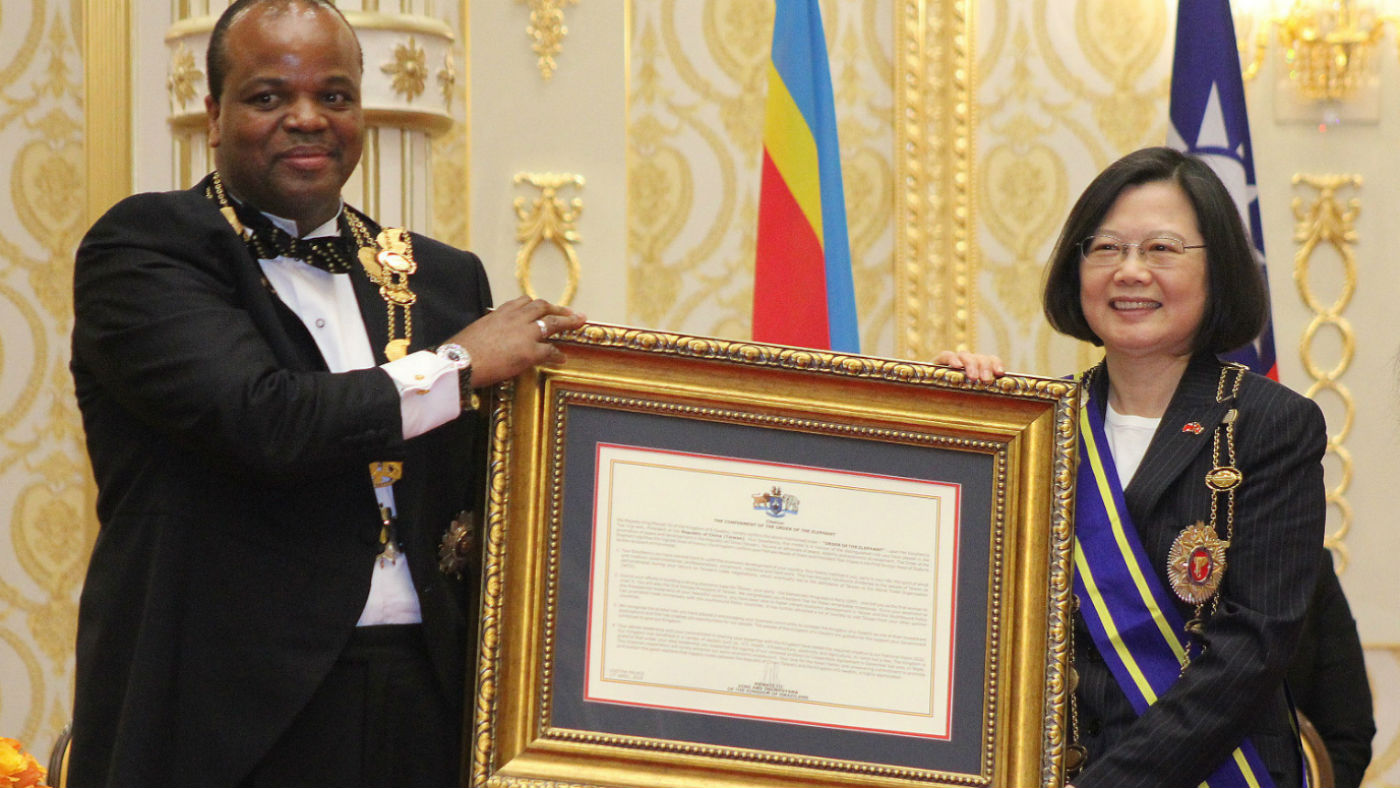eSwatini and Taiwan: global diplomacy’s odd couple
Kingdom formerly known as Swaziland has resisted China’s overtures in Africa

A free daily email with the biggest news stories of the day – and the best features from TheWeek.com
You are now subscribed
Your newsletter sign-up was successful
Chinese attempts to persuade eSwatini to break diplomatic ties with Taiwan have been firmly rebuffed, with the small southern African kingdom insisting that Beijing “must forget about having us in their stable”.
eSwatini, the world’s last absolute monarchy, is one of only 17 countries worldwide to officially recognise the island state, which the Chinese government considers a rogue province.
In recent months, China has been “upping the pressure on the country formerly known as Swaziland”, now Taiwan’s last ally in Africa, says Reuters.
The Week
Escape your echo chamber. Get the facts behind the news, plus analysis from multiple perspectives.

Sign up for The Week's Free Newsletters
From our morning news briefing to a weekly Good News Newsletter, get the best of The Week delivered directly to your inbox.
From our morning news briefing to a weekly Good News Newsletter, get the best of The Week delivered directly to your inbox.
Neverthless, eSwatini Foreign Affairs Minister Mgwagwa Gamedze last week agreed with the Taiwanese government’s description of their relationship as “extremely firm”.
“They are our major partner,” Gamedze said.
Why is China so keen to ‘flip’ eSwatini?
Under the so-called One China Principle, Beijing will not establish diplomatic relations with any country that recognises Taiwan’s nationhood.
A free daily email with the biggest news stories of the day – and the best features from TheWeek.com
This has been an obstacle in China’s push to expand its influence across Africa, in the form of massive investments in business, industry and infrastructure throughout the development-hungry continent.
Through a combination of “inducements and deals, loans and intense diplomatic pressure” beginning in the 1970s, “Beijing has picked off one African country at a time”, CNN reports.
With a major summit for African leaders scheduled to take place in Beijing next week, China has been ramping up the pressure to “turn” the continent’s last holdout.
Yet despite the best efforts of dollar diplomacy, “Swaziland is the country that China just cannot flip”, says the news site.
Why are eSwatini and Taiwan so close?
Just as China has done elsewhere in the continent, Taipei has poured millions of investment dollars into eSwatini since the country gained independence in 1968.
Taiwanese money has funded schools, hospitals, infrastructure projects and businesses in the tiny, landlocked country.
But, after 50 years of close ties, the bonds between the two states go far deeper.
In June, eSwatini’s King Mswati III visited Taipei to see one of his sons graduate from Shih Chien University, where the young royal addressed classmates in Mandarin, the Taipei Times reports.
More than 250 young Swazis are studying at Taiwanese institutions, some of them graduates of the Amitofo orphanage, founded by a Taiwanese monk, where around 180 Swazi children are taught Buddhist prayers, Mandarin and martial arts alongside academics.
Despite this cosy set-up, the attitude in Beijing, where government officials casually speak of the “China-Africa” family, seems to be one of serene optimism.
Assistant Foreign Minister Chen Xiaodong told Reuters that the government looks forward to the day when “all African nations, with none left behind, can take part in positive China-Africa cooperation”.
This complacency may prove justified. In January this year, Burkina Faso’s foreign minister called financial incentives offered by China “outrageous” and reaffirmed that Taiwan is “our friend and our partner”.
Four months later, Burkina Faso flipped.
-
 Local elections 2026: where are they and who is expected to win?
Local elections 2026: where are they and who is expected to win?The Explainer Labour is braced for heavy losses and U-turn on postponing some council elections hasn’t helped the party’s prospects
-
 6 of the world’s most accessible destinations
6 of the world’s most accessible destinationsThe Week Recommends Experience all of Berlin, Singapore and Sydney
-
 How the FCC’s ‘equal time’ rule works
How the FCC’s ‘equal time’ rule worksIn the Spotlight The law is at the heart of the Colbert-CBS conflict
-
 Epstein files topple law CEO, roil UK government
Epstein files topple law CEO, roil UK governmentSpeed Read Peter Mandelson, Britain’s former ambassador to the US, is caught up in the scandal
-
 Iran and US prepare to meet after skirmishes
Iran and US prepare to meet after skirmishesSpeed Read The incident comes amid heightened tensions in the Middle East
-
 Israel retrieves final hostage’s body from Gaza
Israel retrieves final hostage’s body from GazaSpeed Read The 24-year-old police officer was killed during the initial Hamas attack
-
 China’s Xi targets top general in growing purge
China’s Xi targets top general in growing purgeSpeed Read Zhang Youxia is being investigated over ‘grave violations’ of the law
-
 Panama and Canada are negotiating over a crucial copper mine
Panama and Canada are negotiating over a crucial copper mineIn the Spotlight Panama is set to make a final decision on the mine this summer
-
 Why Greenland’s natural resources are nearly impossible to mine
Why Greenland’s natural resources are nearly impossible to mineThe Explainer The country’s natural landscape makes the task extremely difficult
-
 Iran cuts internet as protests escalate
Iran cuts internet as protests escalateSpeed Reada Government buildings across the country have been set on fire
-
 US nabs ‘shadow’ tanker claimed by Russia
US nabs ‘shadow’ tanker claimed by RussiaSpeed Read The ship was one of two vessels seized by the US military